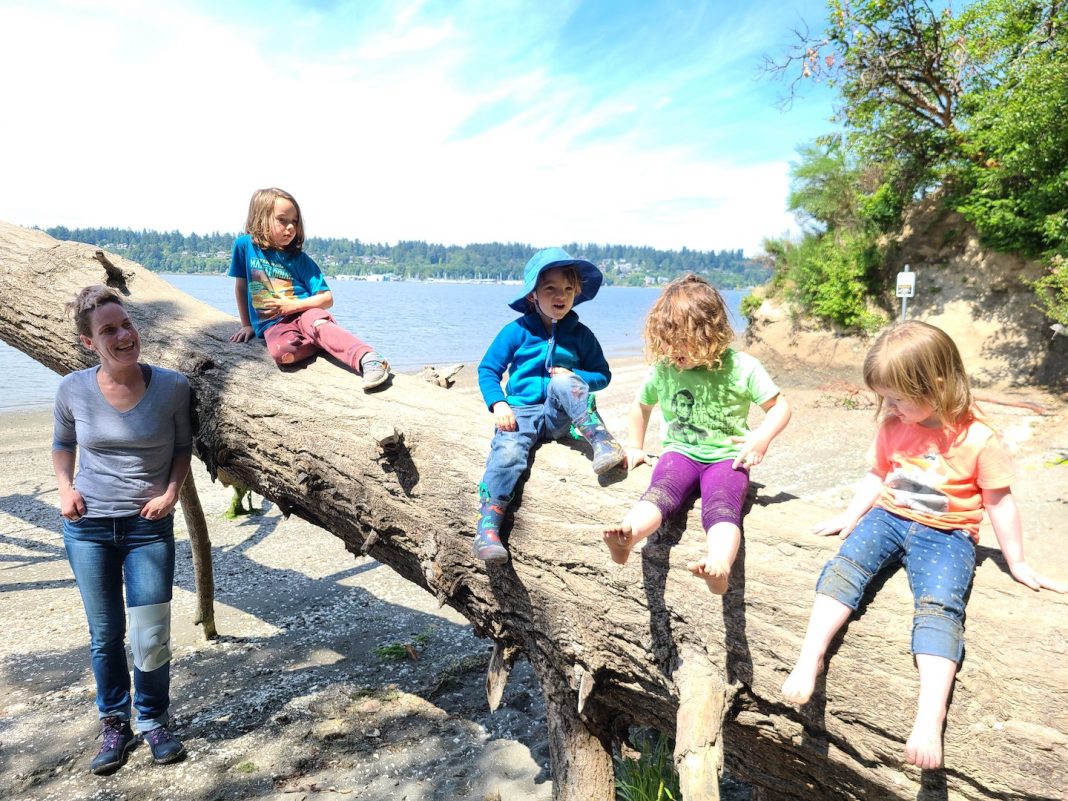Roots and Rhythms is a new outdoor, learning community in Olympia for children from 2.5 to 6 years of age. Business partners Sophia Rychener and Sarah Lumper have combined their 35 years of preschool experience to offer an environment that speaks to the wholeness of young learners. “We trust the autonomy of the child,” explains Sophia. At the program’s core is love with elements of risk, reflection, joy and engagement. Roots and Rhythms might be called a play school or a preschool. It is also an alternative to more structured, indoor classrooms.
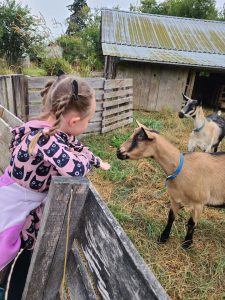
Parents may wonder, “Can my child really be okay outside all that time?” The answer is a resounding, “Yes!” “We dress for the weather,” says Sarah. “Kids get used to being outside.” Appropriate clothing really works. Children are checked to confirm that they are warm enough. The outdoor locations have usable covered spaces.
Sophia and Sarah met when they worked at The Evergreen State College’s Children’s Center. Both started as student staff before being hired as teachers. “We studied many philosophies,” Sarah recalls. Roots and Rhythms integrates their educational beliefs and time spent with youngsters to create a new learning community
“Roots and Rhythms is an emergent program,” says Sophia, meaning they follow the interests of the children. She appreciates the values of Anji Play, a comprehensive, educational philosophy that gives each child opportunities to experience extended periods of self-directed, uninterrupted and unguided play. There are five interconnected principles:
Love: There is power in children being trusted, seen, heard and respected. Reliable, responsive, and consistent environments and relationships foster safety.
Risk: Children get to do activities with uncertain outcomes based on predictions. This provides the foundation for inquiry, learning, discovery and the scientific method.
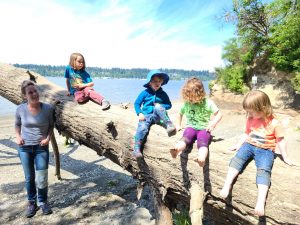
Joy: A clear measure of quality in early childhood programs is the presence of joy. Children develop internal rewards from experiences of risk, sincere engagement and discovery.
Engagement: Exploration and discovery of the physical and social worlds create connection and purpose for young learners.
Reflection: Time is given to thinking, interpreting, and understanding experiences and information.
Trauma Informed Care
One of the day’s first activities is the morning circle. This three-fold experience sounds simple but is complex and powerful in action.
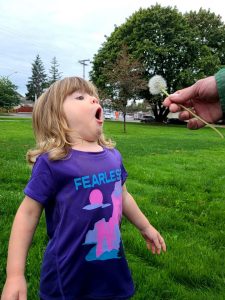
Each child contributes a word that expresses their feelings that day. It may be happy, sad, excited, tired or worried. In this way, children hear that everyone has feelings, feelings change, and all feelings are okay. Next, they share a goal for the day. Then each child identifies who can be asked for help that day, if needed.
The morning circle is about children learning to feel in control of themselves, to empower themselves and to look to the future. This trauma informed care does not assume that children have had trauma, but instead helps create environments that are safe and encourage resilience for all children. Then there is the added benefit of being outdoors. For some children, being outside instead of indoors at a desk allows them to thrive.
Outdoor School is Healthful
Being outside daily is good for mental health. Many children spend precious little time outdoors. Another benefit to the airy classroom is physical well-being, which is particularly important in this viral world. “We prioritize vaccinated children,” explains Sophia, but it is not required. “We are an open and inclusive space. We want parents to know their child is welcome.”
Parents Report Positive Changes at Un-School
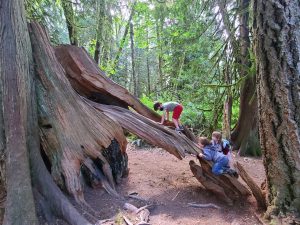
Parents are already giving positive feedback about the changes they notice in their children each week. Social and verbal skills are improving along with gross motor skills. Children exhibit more confidence. “We model and encourage kindness,” affirms Sophia.
Parent Erin Jacobson, a special ed teacher at Lincoln, and her 4-year-old son are thrilled with their experiences. “Sophia and Sarah are good at providing safety and adventure,” notes Erin, whose energetic son has found new joy at school. “He could not sit so well,” she says adding, “His self-esteem has risen along with his self-regulation.” He already knows the paths at Squaxin Park, easily guiding his parents along the trails to the beach. Erin added that after a full morning outside, Griffin has shown a great deal of interest in spending time looking at books at home. “He has confidence,” she says.
There are 12 slots available every day from 9 a.m. to 1 p.m. The low teacher to child ratio allows attention to all the attendees. Children may be enrolled for full or partial weeks.
Roots and Rhythms operates a weekly schedule as follows:
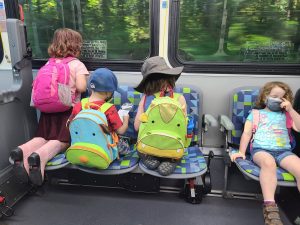
Mondays and Fridays: Circling Together Farm, an organic farm
Tuesdays: Squaxin Park (formerly Priest Point Park)
Wednesdays: Woodruff Park. This is the outing day – they may take the bus to downtown, may walk to West Bay Park, etc.
Thursday: McLane Creek Nature Trail
Children bring their own snacks for a mid-morning break. Parents receive daily communications through Bright Wheel.
Olympia School Meet & Greet
There will be a Meet & Greet at Bits Café on November 9 from 4 p.m. to 6 p.m. Meet Sophia and Sarah to talk more about their new learning community. “It’s a family. That’s the energy we create,” says Sophia. Find more information at the Roots and Rhythms website.
Sponsored







































